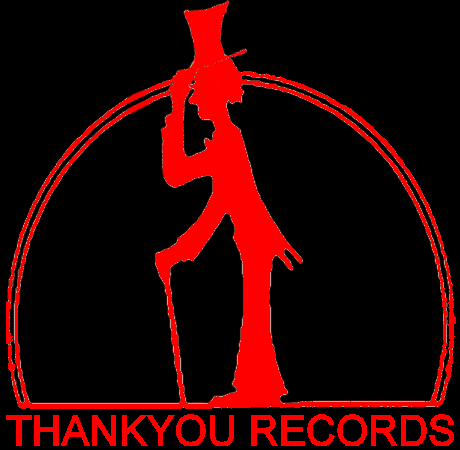It Is Not I Who Seek The Young Fool
From: The Succulence Of Abstraction (MV015)

THANKYOURECORDS
CATALOG / DISCOGRAPHY
M I C H A E L V L A T K O V I C H
Composer / Trombonist
...Vlatkovich is the finest trombonist improvising today. Jazz Review
TRANSVALUE BOOK III
The '58 Retractable Hardtop
PURCHASE
PHYSICAL CD
MV012 (CD) (2007)
$20.00
INCLUDING SHIPPING
The people in the front are going to have a good time.
The people in the back are going to have a good time too.
PERSONNEL
Chuck Britt - poems / vocals
Michael Vlatkovich - trombone
David Crigger - percussion / effects
Matt Cooker - cello
Dominic Genova - bass
Vinny Golia - woodwinds
Lou Gonzales - trumpet
Warren Hartman - keyboard
Glen Horiuchi - piano
Jay Hutson - woodwinds
George McMullen - trombone
Bill Plake - woodwinds
Bill Roper - tuba
Mike Turner - conga
Mark Underwood - trumpet
Jeanette Wrate - percussion
Devora Block - vocal
Danny Block - vocal
Aaron Britt - vocal
Melanie Crachiolo - vocal
Larkin Higgens - vocal
Milena Miller - vocal
Alison Pipitone - vocal
Damon Pipitone - vocal
Damon Pipitone - vocal
Chuck Sabatino - vocal
REVIEWS
"Book III selected among the top 15 CDs of the first half of 2008. Best regards,
Francois Couture", Reviewer, journalist, producer of Delire Musical/Delire Actuel (CFLX)
Absolutely amazing compositions in a truly timeless unique style. Book III is truly a classic! It's great to hear musicians who keep the integrity to their own voice.
Bruno & Peggy Kicks, Extreme Radio @ Radio Centraal (Antwerp, Belgium)
There's something about Charles Morrison Britt. Whether or I not you enjoy his straightforward poetry and gruff and gravely speaking voice, you cannot deny his powerful presence. Although he is backed by a large musical ensemble, with outstanding West Coast musicians including luminaries Michael Vlatkovich, Vinny Golia, Glen Horiuchi, and Bill Roper, this is Britt's gig, and his presence dominates. That said, there are some very good solos interspersed throughout, and Vlatkovich's compositions and arrangements are uniformly superb, with a twisted Swing feel and many will eagerly await the trombonist's big band album (hopefully, sans voice). You might even call this one Anthony Braxton meets Philip Dick meets Gregory Corso. Vlatkovich layers sounds and mixes genres, in what is arguably his best writing on disc. He interweaves soloists with quirky melodies and twisted lines that are original though ensconced in the big band tradition. This works particularly well on "Francis Cheeks," where the piece cradles high-energy solos by the late pianist Glen Horiuchi and saxophonist Jay Hutson. Vlatkovich impresses, too, as a performer, taking solos on several pieces. Britt writes and speaks of feelings, and, as with any good poet, he utters truths about life and death. He has thought about what is important and he often hits the mark. While some are likely to find his delivery tiresome by the final track, there is no denying its serious heartfelt messages, even with a warped sense of humor and sometimes exaggerated delivery. Speaking in the vernacular, Britt's roots might be traced to the Beats, but Britt is less angry and more responsible, even if not less radical. (Three name corrections made.)
Steven Loewy© Cadence Magazine 2008 Oct-Nov-Dec 2008
Transvalue are an amalgamation of talking turmoil and spectacular arrangements, existing since 1980. Its core members are trombonist and composer Michael Vlatkovich, spoken word artist Chuck Britt and percussionist David Crigger; the circle of aides for this CD encompasses a lot of terrific musicians, Vinny Golia being a name that was immediately recognized here. The record is quite long at over 76 minutes, and listening to a somewhat belligerent voice speaking for long stretches may be demanding sometimes - especially for the non-well versed in the English idiom - but boy, can these guys play. There’s not a note out of position, and after a while one even manages to become au fait with Britt’s not-instantly-gratifying rasping tone, which is more or less ever present (although not at all times in a nonstop manner: there are also duets - and lots of beautiful ensemble singing, too). The orchestrations called to memory several beloved entities of mine: Zappa (circa “Greggery Peccary” and “The Grand Wazoo”) on top of everything, The Tubes, British jazz (a number of sections reminded me, in short tracts, of Kenny Wheeler), the whole typified both by drama and thrilled outbursts - exactly as in an archetypal musical. The technical altitude remains persistently remarkable, the eminence of the instrumentalists triumphing upon any potential defect (and I didn’t find so many indeed). My foot was often caught tapping when listening to this. Give these chaps an opportunity: although not really devising anything new, they just sound gorgeous.
Massimo Ricci, Rome, Italy
Chuck Britt, Michael Vlatkovich, David Crigger, Vinny Golia, etc. ...
This is a hurricane and you fall on rubble with the first notes of Transvalue Book III. The thunderous voice of Chuck Britt and the power of his words are supported by a big band playing Michael Vlatkovich’s score which is capable of constant change without losing any of the momentum that physically moves you. A mad embrace of life prevails. The voice and orchestra are tight and without economy, shamelessly and with pleasure unpacking and removing intimate memories that could be embarrassing (text and music are available on the Transvalue site at: http://www.transvalue.info). It is all purely American without doubt, all the more because he is an eastern American on the west coast and he comes in a car. I am listening to this CD for the nth time, and I can’t stop listening to write. I am struck by the words that escape from the voice of Chuck Britt, and the whirlwind of Vlatkovich. The solos are up to the rest. This once in a lifetime machine, is fuelled and at maximum power searching out our violence and tenderness with deadly accuracy.
Noel Tachet
Translated by with help from Google CMB
What is this? A poem cycle in big band jazz cloths? Affinities: Zappa, Yellow Shark? The cabaret-punk orchestra, World / Inferno Friendship Society? City of Mirrors, Motor Totemist Guild? Woodwinds four (including Vinny Golia), four Brass, Bass (Domenic Genova), piano, chorus, this is big! David Crigger on drums, organ & Electronics, and also for recording and mixing. Most compositions are by the trombonist & Thankyou Records label artist, Michael Pierre Vlatkovich, a fixture on the West Coast, especially in the Vinny Golia Large Ensemble and Jeff Kaiser Octet. The libretto comes from Chuck Britt, his poetry is recited in sing-speech style. The TRANSVALUE collaboration has been in place since 1980. Book I appeared in 1985, and in 1988 Book II followed (Teapot in a Tempest). In Book III, Britt’s memories lead us back to his early years in Ohio: The ’58 Retractable Hardtop “I sit in the '58 retractable hard top (parked in the side yard) / It opens up and down like a Nike silo / But I don’t feel safe ... I feel embarrassed / As I wait for Father / Up and down / Playing the radio all the time / Wishing for a "normal" adolescence / American Bandstand girls and buddies to teach me about sex”. The dominant father casts his shadow. I Have These Tears is also pervaded by childhood fears, insecurity and salty tracks. With Wars for the Numb (01-21-91) and Wedding Song Britt makes the transition away from the family front: “Eons of fear and voiceless estrangement / Eons of coercion, violation and destruction/ Hopeless and waste hidden behind racial, regional and national chauvinism”, to politics: “Oh War, please entertain us / Keep us numb, we pray / If you abandon us / Our pain will be upon us ... “. But Britt also makes the next leap in The Kissing Song (Composition by Warren Hartman) beyond his father, to say yes to the course of events and fall in love, even if only like a dog chasing its own tail. Britt is not a formalist; he wears his heart on the tongue. The stories are much more than an ego trip, in fact they inspire the great music of TRANSVALUE, like the tango, Not Knowing with it’s circus music and Ultra Lounge brass arrangement that gives one the arm around the waist and the tongue-in-the-cheek, Britt’s emotions brush against the grain, with his grating presentation itself the yeast steering us in the opposite direction.
Here we have my echo to your fine poetry & music.
Rigobert Dittmann, Bad Alchemy, Franz-Ludwig-Str.11 97072 Würzburg
Translated with help from Google CMB
Another out of the blue - Transvalue are Chuck Britt (vocals) Michael Vlatkovich (trombone, composition) and David Crigger (drums, electronics) with an extensive cast of supporters on instruments and vocals. As the title implies, this is the third release, out on thank you records.
And if you get this it is worth going to the site - because one centre of this album is the words: Britt is beat-influenced flamboyant wordsmith and reciter. These are complex dramatic amusing and evocative poems put to music, and delivered musically (not a spoken-word album). There are choruses and hooks to his lyrics, they are rich in detail metaphor and humanity, and drive the album forward. In many pieces, as a good performance poet, there are repeated elements of words (such as know in Not knowing, or Yes in For Alec from Pappy or structural elements such as the ten-year steps of The father or the memory returns of The new day) that offer pace and focus. Themes include relationships, politics, remembrance that are specific and universal.
But there is also the music created by Vlatkovich. This varies from relatively straightforward big-band jazz in Of dancers or The new day, a tango of Not knowing, or the nostalgic piano and alto of Frances' cheeks, in all of which there are extensive solos like the piano and then trumpet that plays while they dance to the flute and drum in The new day. In The father the music follows the lines of the song, while in Wars for the numb (02-21-91) there is a dense bed of percussive processing that suits the song and For Alec from Pappy has a similar but less dark soundscape. The music combines careful and sympathetic writing with the freedom to improvise.
There are two extended tracks - the ostensible title track is a lovely development of a father/son theme that traverses 50s doowop, faster group work, choruses and a final reflective coda: a wild ride in the hardtop indeed, Wedding song - which opens 'The horror/Only survivors made us/Eons of fear and voiceless estrangement/Eons of coercion, violation and destruction/No one knew' is the most complex lyrically - the poem appears to be an epithalamion which balances the despair and fear with the hope which is represented by love and family. The music reflects this complexity, a pastoral opening is undone by the lyrics and then includes operatic/chorale elements with additional voices and slipping through a variety of styles. I am not sure that it is 100% effective but it is absorbing.
And then, to end the album, comes a further surprise - pianist Hartman wrote the music for The kissing song, a gentle piece with a yearning cello line through that offers a final reflective passage, underscored by Britt's vocals - and I mean vocals. To this point he has been gruff spoken/recitative but here he sings with a mellow croonerish 50s tone that swings the album in a different direction, ending on a subtle note.
The three (old) geezers on the cover of this album, the cheesy colors and layout of it and the site, belie an album of breadth, musicality and sophistication which is a surprise and delight.
AMPERSAND ETCETERA Posted by: Jeremy Keens, Mount Macedon, Victoria, Australia
http://ampersandetc.blogspot.com/2008/06/transvalue-book-iii-58-retractable.html
In TRANSVALUE BOOK III David Crigger, Chuck Britt and Michael Vlatkovich created the third part of the TRANSVALUE saga. The CD is subtitled, “The ’ 58 Retractable Hardtop”, and is released by Thankyou Records through Transvalue Press. This production links poetry (spoken word) and music of many types: jazz, pop, funk, music of the cinema, the circus, the casino, serious classical music, cabaret crooning, and the familiar sounds of life and very much more. The poetry, which covers subjects like sex, morality and transcendence, is in the best tradition of the beat poets. Chuck Britt recites with a flexible voice and great timing. He is able to reach many registers and accents in each line with the necessary quantum of emotion to create the intended effect.
The basic trio is reinforced and expanded substantially with the addition of notable members of the North American improvisational and experimental music community including: Dominic Genova (bass), Glenn Horiuchi (piano), Vinny Golia, Jay Hutson and Bill Plake (sax), Lou Gonzales and Mark Underwood (trumpets), George McMullen (trombone), William Roper (tuba), Melanie Cracchiolo and Chuck Sabatino (vocals), Warren Hartman (keyboards), Mike Turner (congas), Matt Cooker (violin), Jeanette Wrate (percussion).
With a feel of the 70's, this disc was produced with the same pleasure and impudence what Frank Zappa put into his best productions of that time. Lush arrangements are built up and become almost conventional but soon they are shredded and re-sewn into truly new clothing.
The feminine voices are another strong component in this multifaceted universe of colors, tastes and ideas. Flashy and noisy, technically competent and flooding with creative ideas, this is a simple, spontaneous, witty and serious adventure into megalomania. Book III is worth the effort and the time.
Posted by Eduardo Chagas @ 23.4.08 Oeiras, Portugal
Translated from Portuguese with help from Google
http://jazzearredores.blogspot.com/search?q=Transvalue
For nearly three decades, Michael Vlatkovich (trombonist and composer), Chuck Britt (poet and performer), David Crigger (drummer and sound designer) have united their inventiveness to produce trance instrumentals and vocals in line with Tom Waits, Mark Twain, Charles Bukowski and Anthony Braxton. TRANSVALUE is a pleasant but strange salad/sound/creation and the taste of shinning verbs spanning all styles. Some hear Captain Beefheart on a Rabelais horse. Others notice very troubling affinities with the world of Zappa: doo wop rubs funk with a brass deluge. This album is the third part of a trilogy in which the trio, brims with energy and is more than convincing. The speaking voice of Chuck Britt, grating and cavernous, perches above a vast body of instruments sounding like a film score of horrors and farces. Funny, carnival improvisation, musical or noisy citations, pharaonic arrangements resulting in a muscular journey. At 18, David Crigger debuted in the orchestra of Don Ellis and then he accompanied Brian Auger and George Duke before joining Burt Bacharach. His bizarre electronic quirks are important to the whole. Michael Vlatkovich moves with a strange (which means absolute originality) security that ricochets sometimes between waltz and tango, sometimes reminding us of Kinderszenen by Robert Schumann. This kind of writing enters the head of the listener and never leaves. He must have seen 200 Motels, the film from the Mack Sennett psyches of Frank Zappa and Tony Palmer, to grasp the possibilities and give birth to this delicious and frilly sound.
By Guy Darol, Metropolis, A blog and online-shop for jazz, improvised and ‘unheard’ music.
Translation with help from Google CMB
http://www.m-etropolis.com/wordpress/?language=en
Inversion of all values. The nietzschéens of Transvalue are three (Michalel Vlatkovitch, Chuck Britt, David Crigger) and sound like twenty-five. This is the approximate number of soldiers present on this album, the third opus delivering battle against music standard. A beat poetry trio led by the spoken word artist Chuck Britt. That means (open hatches and large quinquets) that the eleven tracks on this gem run simultaneously and in turn the world of Mark Twain and Anthony Braxton, Richard Brautigan and Frank Zappa, Charles Bukowski and Charles Ives. But it should still include Captain Beefheart, George Duke, Ornette Coleman, Duke Ellington, Federico Fellini, Roy Rowland, Astor Piazzola. You follow? Your work monumental juicy, ocean zoroastrale.
Guy Darol, Agitateur Conseil
Translated from French with help from Google CMB
http://www.guydarol.fr/archive/2008/06/20/transvalue.html
Note: I think when Guy mentions “nietzschéens” and “zoroastrale” he is referring to Friedrich Nietzsche who talks about the Transvaluation of Values in his philosophy (from which our group filched the name TRANSVALUE) and in Nietzsche’s famous book Thus Spoke Zarathustra which refers to Zoroaster the Persian prophet and religious poet. cmb
I just received your truly interesting CD, TRANSVALUE BOOK lll. I usually check out bits of cuts, I have my earphones on!!! I am the dj for THE LATEST SCORE on WOMR FM in Provincetown, Ma and streaming at WOMR.org I play new art music and everything that rubs up against it. You’re rubbing a groove! I notice your listed under ROCK but I haven't heard that yet. It sounds like new art music to me! Every time I play from this album I will email you the particulars.
Thank you for the music,
Canary Burton, Wellfleet, Ma
WOMR.org streaming 24/7
I just want to say thanks so much for sending WPVM a copy of the new Transvalue CD. It is definitely up our alley in terms of the progressive, thought-provoking jazz that we love to play.
Jonathan Price WPVM Jazz Director, Ashville, NC, USA
Thanks for the transvalue BOOK III '58 retractable hardtop. I have been playing it in our studio for most of the week + played it on my shot on WTUL this morning. Again, thanks. Will keep playing it - for sure.
David Gregor W T U L FM 91.5 New Orleans Louisiana
I really enjoyed the new CD. Even better than the last one I'd say. It harkens to some of the great iconoclasts like John Trubee, Carla Bley's JCOA period, and even Zappa. Excellent work and I look forward to airing ASAP.
Thanks, Don Campau
No Pigeonholes broadcasts your music in three different ways.
FM Radio> KKUP, 91.5 FM in Cupertino, California broadcasts live to the San Francisco and Monterey Bay Areas twice a month. The second and fourth Sundays 3-5 PM
Thank you for sending me a copy of your latest disc Transvalue III. It's great and I will start playing it on air as of next week on The Spice of Life, one of two shows I have here in Sydney. Just out of curiosity, how did you find out about my show (assuming you sent me the disc)? After having digested in greater detail what you have sent me I would like to do an interview at some stage. Regards, thanks again and best wishes from the real land of Oz.
Hans Stoeve
Powerspot (not just a world music show)
2SER FM Wednesday Nights 1900-2030
The Spice of Life
2SER FM Tuesday Afternoon 1330-1500
Listen online @ www.2ser.com
Sydney Australia
I received your Book III this morning, it is full of blood and knowledge, a friendly hurricane! I will send you the review (in French) I will write for Improjazz.
Thanks a lot for this lively music, yours
Noël Tachet, Saint-Hilaire Saint Florent , Saumur, France
TRANSVALUE: Book III – The ’58 Retractable Hardtop Thankyou, 2008
Gonzo mix of beat poetry and avant-garde jazz out of LA, with some great players. Chuck Britt growls out humorous, angry or philosophical poems (many about family or crises of the self) with gusto, and the band is all over the place. There’s more than a touch of Frank Zappa in here... it’s weird and wild and wonderful, how can you not love it? Simply awesome. Fo’s Picks: 1, 2, 4, 5, 8, 10
Reviewed 2008-06-14 KZSU, Stanford California, ZOOKEEPER ONLINE
http://zookeeper.stanford.edu/index.php?s=byAlbumKey&n=869687&q=10&action=search&session=
Hello, first sorry for my english... is very bad!
I received your cd, i liked, listen in my radio program, thanks!!!
Kisses from Spain, Nando
Nando Caballero, Director/Presentador, "L'altra cara de la lluna", COMRàdio, Barcelona, Spain
It is a very strange creature that held together somehow by Vlatkovich and the histrionic Chuck Britt and do not underestimate the role of technical and multi-instrumentalist Crigger, who at eighteen sounded the drums for Don Ellis! These three recruited many talented shift workers of pop, soul, hip hop, film and TV, experimenters and jazz musicians.
With a long interval between studio performances in the nineties and this release; recorded in one decade... produced and released in the next. So much time went by that this CD is dedicated to the memory of participants: Sabatino, Horiuchi and Turner who died in 1996 and 2000.
The music is so overflowing with situations, inventions, surprises, lapels and affinities (from Zappa to Carla Bley, with and without Paul Haines, and then the circus, cabaret, latin rhythms, overlapping melodies, moods and loves) that you don’t want to miss the savory recitatives, the polemic and the too rare sung parts, all very tasty.
Alessandro Achilli Musica Jazz viale Sarca 235 20126 Milano
http://it.wikipedia.org/wiki/Musica_Jazz
Larry Blood playing Book III on the radio in Santa Cruz.
OFOB playlist for 3/1/16: Transvalue Book III (Michael Vlatkovich, Chuck Britt...)- Not Unknown- The ’58 Retractable Hardtop- Thankyou Records 2007
OFOB: Presenting jazz and extensions as a living art form, with tradition a byword for music moving into the future. A KUSP-FM featured program serving California’s Central Coast since 1983, airing Tuesdays from 8:00pm to 11:00 pm PST.
KUSP, Larry Blood, Outfront, Outback:
http://blogs.kusp.org/outfrontoutback/
Listen to the most recent show via: http://kusp.org/archive/102.html
ART
Chuck and his friends can make a quick trip to the past,
visit his childhood home,
and never leave their present orbit...
TRANSVALUE BOOK III
The '58 Retractable Hardtop
PRODUCED BY: Chuck Britt, Michael Vlatkovich and David Crigger
Take a trio in the best beat- poetry tradition, - a storyteller, a jazz trombonist and a drummer -- with all of its promise of interaction, communication and “in the moment” interplay... Now expand it -- more players, more voices; broader drama, wilder expressions; while losing none of its spirit and spontaneity and you have Transvalue -- an ongoing exploration of the inner depths of human interaction and the outer reaches of jazz... and where both come together as one.
Since 1980 under the name, TRANSVALUE, trombonist/composer Michael Vlatkovich has been, with his unique brand of improvisationally-friendly compositions, creating musical settings to support, surround and interact with the writings and vocal performances of spoken word artist Chuck Britt. The third integral component of this repertory company has been drummer/percussionist, David Crigger. His role as recording engineer/mixer has grown beyond mere capturing of performances to include editing, shaping and extending those performances to match Transvalue’s current vision of itself. Transvalue has now grown into a repertory company of experimental jazz artists with the instrumentation varying with the needs of the material.
• Produced by Chuck Britt, Michael Vlatkovich & David Crigger
• Recorded and Mixed by David Crigger
• Art by Chuck Britt
• Mastered by Rob Shrock and David Crigger
• All Words by Chuck Britt
• All Music by Michael Vlatkovich - except
“The Kissing Song” by Warren Hartman
“For Alec From Pappy” by David Crigger
Copyright ©2007 All Rights Reserved
Transvalue Book III is dedicated in loving memory to:
Glen Horiuchi, Chuck Sabatino and Mike Turner
MORE TRACK INFORMATION
1. Not Knowing
(Britt/Vlatkovich)
Vinny Golia - Piccolo Solo
David Crigger - Organ, Castanets
2. The ‘58 Retractable Hardtop
(Britt/Vlatkovich)
Lou Gonzales - Trpt. Solo • Michael Vlatkovich - Trmb. Solo
Jay Hutson - Alto Solo • Glen Horiuchi - Piano Solo
Vinny Golia - Piccolo Solo • Mark Underwood - Trpt Solo
Melanie Crachiolo & Chuck Sabatino - Vocals
Devora Block, Danny Block, Aaron Britt, David Crigger, Larkin Higgens, Milena Miller, Alison Pipitone
& Damon Pipitone - Additional Vocals
David Crigger - Organ, SFX, Loops & Add. Keys
3. I Have These Tears
(Britt/Vlatkovich)
Bill Plake - Tenor • Michael Vlatkovich - Trombone
Chuck Britt - Hummingbird
4. Frances’ Cheeks
(Britt/Vlatkovich)
Glen Horiuchi - Piano • Jay Hutson - Alto
Melanie Crachiolo & Chuck Sabatino - Vocals
5. Wars For The Numb (01-21-91)
(Britt/Vlatkovich)
Dominic Genova - Bass
David Crigger - Ethnic Drumset & “Taiko” Ensemble
6. Wedding Song
(Britt/Vlatkovich)
Melanie Crachiolo & Chuck Sabatino - Vocals
Vinny Golia - Baritone Solo • Warren Hartman - Keyboards
Mike Turner - Congas • David Crigger - Add. Keyboards
Warren Hartman, Larkin Higgens, Milena Miller & Michael Vlatkovich - Additional Vocals
7. The Father
(Britt/Vlatkovich)
Bill Plake - Tenor • Michael Vlatkovich - Trombone
Jeanette Wrate - Drums
8. Of Dancers
(Britt/Vlatkovich)
Bill Plake - Tenor Solo • Glen Horiuchi - Piano Solo
Mark Underwood - Trmpet Solo
Mike Turner - Congas
David Crigger - Organ, Rhodes
9. For Alec From Pappy
(Britt/Crigger)
Jeanette Wrate - Drumset Source Performance
David Crigger - Extreme Sonic Manipulation
10. The New Day
(Britt/Vlatkovich)
Jay Hutson - Alto Solo • Bill Plake - Flute Solo
George McMullen - Trombone Solo
11. The Kissing Song
(Britt/Hartman)
Warren Hartman - Piano, Keyboards
Matt Cooker - Cello • Jay Hutson - Alto
Michael Vlatkovich - Trombone
David Crigger - Bass, Additional Keyboards
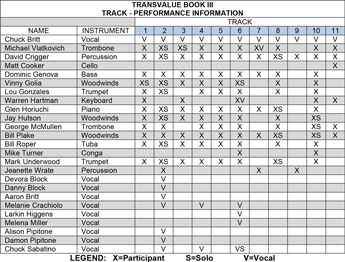
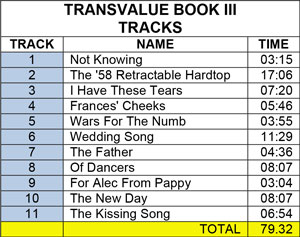
MV012 BACK
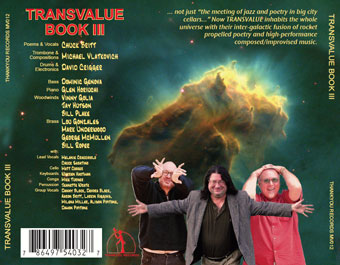
MV012 XVALUE
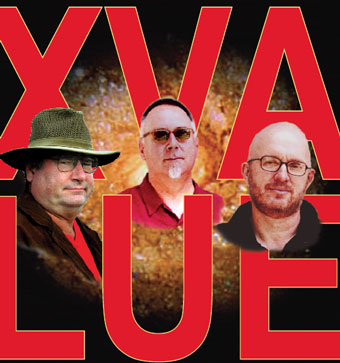
MV012 DISC
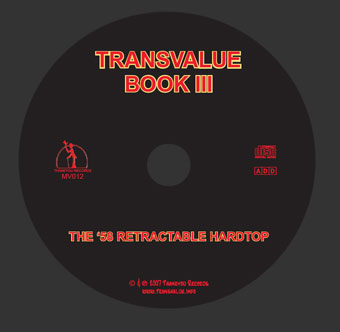
2010 HOLLYWOOD VIDEOS Credits
KHELAVNI
THE FATHER STONE
TO ACT
LATENT MONK
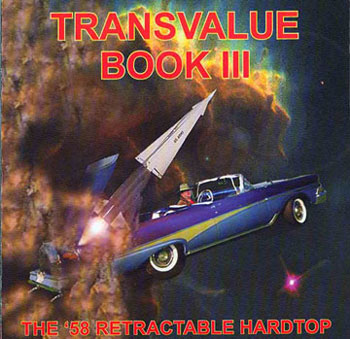
AliveBUQUERQUE
Michael Vlatkovich Quartet
PURCHASE
PERSONNEL
Christopher Garcia – drums / percussion
Jonathan Golove – electric cello
David Mott – baritone saxophone
Michael Vlatkovich – trombone / percussion
REVIEWS
ALiveBUQUERQUE belongs to the listening-for-myself category. It's a spirited set recorded live at the Output Performance Space, Albuquerque, in 2003. This is a potent lineup of avant-improv compositions played by a worthy cast. Mr. Vlatkovich and David Mott, on trombone and baritone sax, respectively, provide a nicely dark, deep-toned two-horn frontline. We've covered David Mott's own interesting work in some depth on these pages and he again shows that attention to your sound as well as the notes themselves, and a thoughtfully structured improvisational sense can distinguish you from the pack. He and Vlatkovich interact on various levels, and they do it in the best interactive traditions of the music. Michael has roots in his playing and they come out most attractively here. There's a generally out context but there is a connection with the past as well.
The electric cello of Jonathan Golove gives another color and a third melodic voice to the ensemble. The pitch range of the cello allows Garcia to oscillate between what an acoustic bass might do in this kind of playing situation and also another "horn," so to speak. Drummer Christopher Garcia fills out the ensemble with a quite respectable free-to-pulse approach. His percussion work adds another dimension of color and texture as well.
Mr. Vlatkovich may not be a household word--and how many improvisational trombonists have ever been that anyway--but he most certainly deserves wider attention. ALiveBUQUERQUE gives you a very good example why that seems so to me.
grego applegate edwards
http://gapplegatemusicreview.blogspot.de/2010/08/trombonist-michael-vlatokovichs.html
L.A. trombonist, Michael Vlatkovich, is a restless spirit, as each of his half dozen plus discs proves. Each one is very different, both instrumentally and concept-wise. For this disc, Michael has put together a quartet with a fine drummer and an electric cellist, both of whom I am unfamiliar plus the great baritone work of Canadian David Mott, who I know from discs on Victo and a duo I caught with David and Dave Lopato. This is certainly a unique sounding quartet with trombone, bari sax, el. cello and drums. On "Black Triangles", the cello and drums are well connected as in rhythm team while the bari and trombone play spirited harmonies. The cello, bari and trombone each take strong solos here. I like the way the cellist switches between the role of the bassist (by plucking and bowing) and playing some twisted solos as well. David Mott is a marvelous soloist and takes a number of inspired solos here, both passionate and consistently creative. Vlatkovich often writes songs that have the bari and trombone both playing rich harmonies and then circling around one another tightly. Their drummer, Chris Garcia, must stay on his toes as he shifts between sections and changes dynamics as he plays his parts and helps to navigate while pushing the soloists to reach higher. Another winner from the fine folks at pfMentum. -
BLG, Downtown Music Gallery
http://www.downtownmusicgallery.com/Main/index.htm
http://www.pfmentum.com/PFMCD045.html
This disc is the product of a May 19, 2003 concert at the Outpost Performance Space in, you guessed it, Albuquerque. The hour long set represented on this recording is a wonderful collection of music played by a rather eclectic yet blended quartet. The instrumentation of percussion, baritone sax, electric cello, and trombone shows a clever amount of sonic unification as well as diversity. The performers aren’t afraid of the full range of their instruments (several times I thought Mr. Vlatkovich switched to trumpet) and they are able to carve out their own musical space when necessary. The electric cello doesn’t quite have the same edgy presence as the other instruments and that is used as an asset instead of a liability.
Each piece contains a playful sense of freedom and structure. From the first gesture of Black Triangles, Yellow Corn, and Pink Medicine Drops through the “oom pah pah” section to the freewheeling bari solo and then the punchy trombone/sax duet that gradually pulls everyone in, etc. and so on, there is a real Zappa-esque feeling throughout the disc. We go to unexpected places within a single track but each move, no matter how drastic, sounds right. The music seems to come from a place of serenity and organicism. I’ve known a number of people who respond this way to time in New Mexico and it seem the Michael Vlatkovich Quartet has fallen under the same spell.
The quartet has an excellent sense of pacing and silence. Gestures sit in space, the group breathes as a unit, and they have an excellent sound color. The opening of Blue Fragmentshas a spunky tune (almost cutesy) in muted trombone and electric cello while the bari sax riffs unencumbered. The opening lyrical solo by the bari sax in Every Second of Every Minute of Every Hour is sensitive and beautiful. I’m sorry I missed the concert but I’m glad to have this record of it.
Sequenza 21/ Posted by Jay Batzner in CD Review, Jay Batzner This entry was posted on Tuesday, October 2nd, 2007
http://www.sequenza21.com/cdreviews/2007/10/michael-vlatkovich-quartet-alivebuquerque/
Early on with Alivebuquerque it is abundantly clear just how "on" this quartet is as this unusual instrumentation plumbs a rare musical intuition that shows off both the compositional material and the improvisation of the moment in an ideal light. The electric cello in particular cuts through this percussion plus low brass and reed texture with razor sharp precision. Deftly allowing its amplification to alternate between blending within the overall sound and carving out moments of serious contrast. But it is the subtle pull and drag at the collective sense of time that makes this set so engaging for the full hour. That and the ability to hang spontaneous detail along its aurally poetic lines.
Posted by Devin Hurd July 23, 2011
http://hurdaudio.blogspot.de/2011_07_01_archive.html
This is an electic mix of instruments. How often do you see electric cello jamming with a trombone or a sax? So how would this strange blend of instruments work? 'ALiveBUQUERQUE' is an almost hour long album made up of five [5] creative tracks where the music goes off on interesting journeys. One track is over 17 minutes in length! The long cuts allow the band to explore unusual instrumental combinations and they play with and off each other. Instrumentally taxed might describe the way the players jam. At times soft and slow, and then fast and frenzied, and everything in between. Check out "Every Second of Every Minute of Every Hour" (17:36) and maybe you'll get an idea. I was surprised at how relevant and good the music got. It wasn't disjointed or too 'way out.' I enjoyed the musicianship and appreciated the unique instruments and their interplay. As I said, a clearly eclectic mix that really worked out fine. Check it out.
Copyright 2007 A. Canales Review Ed fanofgold@yahoo.com > The CRITICAL REVIEW SERVICE > PO BOX 3593 > El Paso, TX 79923 USA
Trombonist Michael Vlatkovich is a stalwart of the LA creative music community, an early cohort of Vinny Golia and other artists associated with the multi-instrumentalist’s Nine Winds imprint. He has led his own ensembles since the early 1980s, emphasizing an idiomatically off-center compositional vocabulary and providing ample space for improvisation. Recorded at Albuquerque’s Outpost Performance Space in 2003, this quartet set with baritone saxophonist David Mott, electric cellist Jonathan Golove and drummer Christopher Garcia shows how Vlatkovich’s writing can encompass stentorian themes and sardonic waltzes in a single piece without fracturing it into vaguely connected sections. He is also adept at slipping in such sudden jarring changes in direction as a riveting unison phrase in the midst of a pensive, elastically stated canon without sabotaging the overall mood of the piece. As an improviser, Vlatkovich is thoroughly grounded in the post-Mangelsdorff trombone lexicon, but throws down his chops sparingly. When Vlatkovich and Mott do lock horns, the resulting intensity is refreshingly stunning. Still, Vlatkovich’s music frequently has a formal bearing that owes much to the ensemble-minded work of Mott, Garcia and Golove, whose electric instrument proves to be remarkably flexible in lending rhythmic support and tonal mooring, or providing counter lines and harmonic extensions. It’s music with more than a quarter-century’s refinement behind it. Vlatkovich has known the loneliness of the long distance runner a long time – it’s time for folks to catch up to him.
Bill Shoemaker
ALiveBUQUERQUE is a recording of a 2003 concert that finds the group working through five Vlatkovich compositions that feature a considerable amount of collective improvisation. In an age where the 3-minute pop song is becoming increasingly ubiquitous, the notion of largely improvised music may seem daunting to some. To the contrary, the skill and imaginative approach of these musicians, coupled with the compositional acuity of Vlatkovich himself, make this album accessible and engaging. These compositions are skeletal, and much of their effectiveness derives from this quality; in his writing, Vlatkovich provides stylistically and texturally diverse points of departure for the group, but leaves more than ample room for the quartet to stretch out improvisationally. For their sparseness, Vlatkovich’s compositions are still appealing. The eccentric groove of “Blue Fragments,” for instance, gives evidence of Vlatkovich’s ability to seamlessly integrate different elements into a unique compositional voice. Compositions notwithstanding, this is an album that features improvisation, and it is in this capacity that the quartet excels. Oscillating between melody and cacophony, with a sparseness that is bravely approached and effectively executed, the group seems perfectly at home in this music. Each of the four musicians has a strong individual voice, but perhaps more importantly, each has a refined sensitivity to the dynamic of the group.
In the liner notes to this album, it is stated that “there is chance, and probability, and negotiation…” It is in the negotiation that this group sets itself apart. The imaginative discourse that occurs as these musicians find an equilibrium together for their strong individual voices is what makes this album so appealing to listen to, and is the albums greatest success.
JuSTIN LITuN IAJE Canada Bulletin • 13 Fall 2007
ALiveBUQUERQUE trombonist Michael Vlatkovich is a great disc quartet that, as the title indicates creatively, was recorded live in the city of Albuquerque, New Mexico. As that area made famous by American films, even the music is definitely the border and the four intrepid musicians (Christopher Garcia on drums and percussion, Jonathan Golove electrified cello, David Mott on baritone sax and leader Michael Vlatkovich, trombone and percussion) seem fugitives looking for a new balance between the boundless lands dominated by cactus and the Rio Grande.
Michael Vlatkovich was born in Saint Louis, Missouri, but he moved to the West Coast since 1973 and is particularly active in the Los Angeles. As a trombonist is definitely one of the best of his generation and his skills as a musician of great value are also confirmed in the area of composition and organizational. This unusual quartet instrumentation brings a really admirable sense of adventure, with solos that are always cut into the work of the ensemble are at the same time looking to new structural escapes.
Unknown Translation from Italian by Google with CMB.
What a formidable lineup. Each a solid leader in their own right, as an ensemble they improvise as a unit: What could have been a session to see who could outblow the other, instead becomes a delightful study in interplay. From the opening squeeks and slapped mouthpieces to the closing concertina with brass counterpoint, this is a collection of great improvs that will bear repeated listenings. Birdcalls, trumpeting tuba, harmon (plunger?) trombone, fluttering trumpet interrupted by splashes of percussion, trombone quoting Gershwin behind a groove of shakers·and that is just one track.
Ice Flow
ART
CD045 ENVELOPE BACK
COMPOSITIONS:
1. The Blue Robes
2. Once In A Blue Moon A Decent Wolf Comes Along
3. Blue Fragments
4. Black Triangles, Yellow Corn, And Pink Medicine Drops
5. Every Second Of Every Minute Of Every Hour
PRODUCTION:
Recorded in concert - Outpost Performance Space, May 19, 2003
Recorded and mixed - Manuel Rettinger
Edited and mastered- Wayne Peet
Sculpture artist - Justo Xuana
Photos of sculpture -William Roper
All other photos - Mark Weber
Graphic design - Chuck Britt
Surely we have arrived Nefertiti. Such luminescence. Our
audience brings us forward, carrying our transcendence.
Our fate. This music like mercury silver hot upon the wheel
cycles out tentacled delicate flux rotating matter, solar,
nebraska, consonance in this tangential place ye shall
know as New Mexico. How many years has this composer
borne such honesty? The river it flows upon is specific.
Yet nothing about it holds the musicians down. There is
chance, and probability, and negotiation, and a compass
in case anybody wants to look. The delta can be treacherous
at certain times of the year. O Nefertiti how calm you are
in the center of this music.
18june03
mark weber
Albuquerque
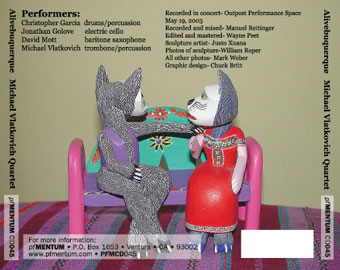
CD045 TACKS
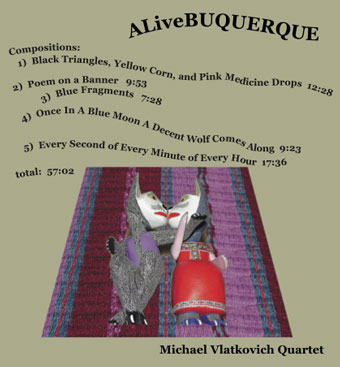
CD045 TRAY
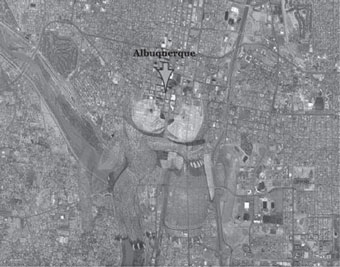
CD045 TRAY INSIDE
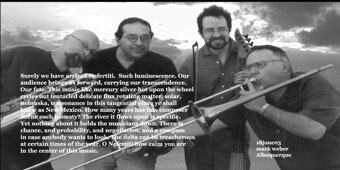
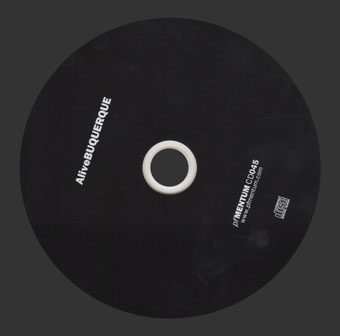
CD045 DISC
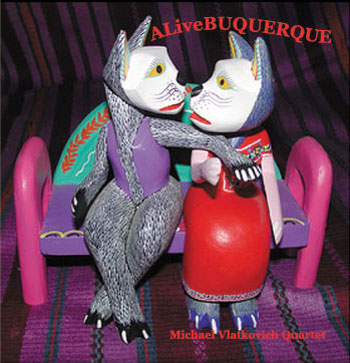
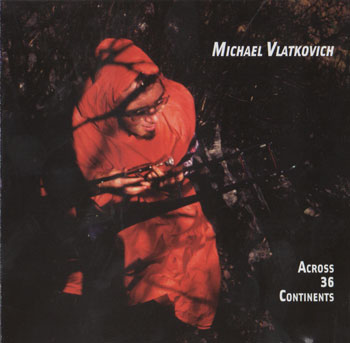
Across 36 Continents
PURCHASE
PERSONNEL
PERSONNEL
Michael Vlatkovich – trombone / percussion
Tob Blakeslee – trumpet
Jeff Kaiser – trumpet
Jill Torberson – french horn
Michael Powers – bass
Mark Weaver – tuba
Rich Halley – tenor saxophone
Kurt Peterson – alto saxophone / tenor saxophone
Alan Lechusza – bass clarenet
Chris Lee – drum set / vibes / percussion
Mark Weber – Narrator
REVIEWS
The West Coast produces ironic music. Musicians are angels who do not believe in heaven, but they know that, even among the chosen, one does not make music for the happy few. Michael Vlatkovich’s nine buddies on ‘Across 36 Continents’ (pfMENTUM CD030) are great musicians and they encountered a street preacher’s compositions evoking Tuba Mirum (Hark, the trumpet) of the Mozart Requiem, with trumpeter’s ringing out, driving hounds chasing down a dying legacy and all is hidden. Even in heaven the rise and fall of the scales are played.. but the final note is still missing.
Is it jazz? Absolutely, as the west-coast has not seen. Do not complain about the rarity of this grouping but rather enjoy this convergence of musicians. The music of Vlatkovich often balances swing and tempo to the sonic material about it without leaving behind a classic feel. Some chills and thrills and smiles for the listener, the angels spare us nothing.
Noël Tachet
Michael Vlatkovich is... another trombonist composer. He's been prolific in the number of releases featuring a variety of configurations. On (4) Across 36 Continents he employs a 10-piece band that's heavy on the brass, but with only a single percussionist in the rhythm section. The music has a wide stylistic span ranging from free blowouts to passages that have a whiff of French salon music. It's a spiraling messy affair. "5 Why Zee 1" has tangles of freewheeling horns over out-of-time drums. But Vlatkovich keeps the piece focused by regularly introducing ensemble punctuations that in the end evolve into a vamp. "I Have These Tears," in contrast, evokes the sound of the West Coast School with its lush brass textures and Bop saxophone interplay. "9113" opens with a brass quintet worrying a five-note phrase over suspended time before Kurt Peterson on alto saxophone picks up the thread and smoothes it out with his creamy French classical saxophone tone. "It's Too Much ... " veers from funky plunger-muted brass to a classical trumpet and trombone duet winding up with tenor saxophonist Rich Halley blowing over a backbeat and a mess of brass. "Be Careful" has 1:he brass offering an intentionally stilted mechanical figure as Mark Weber reads a brief poem about L.A. traffic. Halley returns to close the session with the lament "All of You .. :· crooning over a rich brass chorale. When reviewing anything by Vlatkovich, I find it impossible to determine whether any particular recording is the best or a better representation of his work. Every session seems to exist in its own space, linked of course by certain concerns and a high level of execution.
Suffice to say this continues that pattern.
David Dupont, CADENCE Vol. 32 No. 6 June 2006
Red-robed and monkish in guise in the booklet and tray card photos to this disc, Vlatkovich looks uncannily like a similarly clad Joe McPhee circa the Hat Hut LP Graphics (a visage since co-opted as the Eremite label logo): Much of the music is dense and intricately structured, making canny use of the tentet's dimensions and diversity to layer frictional voicings between various sub-factions of horns. The band is decidedly brass-heavy, with the reeds of Peterson, Halley and Lechusza outnumbered two to one. Lee also assumes weigh ty responsibilities as the sole source of conventional rhythm, but Vlatkovich's clever scores demonstrate a Hemphill-like capacity for capitalizing on the variedhorn sonrities such that piano and bass are hardly missed. What's most surprising and gratifying is how seamless so much of the program sounds. "5 Why Zee 1"· moves from free-floating duet between leader and Kaiser to a swirling sortie incorporating the horns en mass to a Jazzy blast from Halley and a final statement from Lechusza's throaty bass clarinet all in a span o~ less than four minutes. Turning. to lush Kenton1a.n swing for "I HaveThese Tears, Vlatkov1ch engineers rich contrapuntal line~ that create the semblance of a group twice the size, closing with a brazen Buddy Rich styledrum showcased by Lee. The ungainly, and enigmatically titled Asking How Tiny Screams Rust Thousands of Times Beneath Enormous Rocks" updates the sound to Stan circa the Innovations Music Orchestra and intimates an influence of Bob Graetinger in the soaring horn dissonances that initiate the piece. "Be Careful" brings forth Vlatkovich’s jocular side as the brass section ·bathes in reverb and echo and a terse spoken word haiku that poses far more questions than it answers. The second half· of "8" is similarly loaded with colloquial humor. After a mannerly solo musing by Blakeslee, the leader resorts to his best tailgate exhortations, working plunger and slide and voicing greasy smears atop Rich's frothing
press rolls before a dive into band polyphony Blessed with another mouthful of a title, "It's Too Much To See things Any More Clearly Than One Must See Them” sets up a similar dynamic in its final minutes. After an orchestral opening akin to the austere grandeur of Copland, the piece pares down to just Halley and the drummer for a spirited duet that brings out the best in the saxophonist. Halley also dominates the closing coda "All Of You None of Us Know,” his tenor leading the charge through a verdant forest of harmonizing brass and some of the most expressively emotive playing of the date. Vlatkov1ch and his cast of Left Coast pfMentum All-Stars have conceived and hatched another winner.
Derek Taylor, CADENCE Vol. 32 No. 5 May 2006
West Coast trombonist Michael Vlatkovich displays some mature yet nonconformist writing and arranging on Across 36 Continents. The eccentricities prepared for this ten-piece small orchestra make for fresh and at times freewheeling music-making. Then again, Vlatkovich is known for being a bit unconventional. His recent work has been in duets: Call And Response (pfMentum), with poet Dottie Grossman; and Chobraty (Nine Winds), with tubaist William Roper.
Here he enlists some of his usual suspects and playing partners: trumpeters Rob Blakeslee and Jeff Kaiser; and saxophonists Kurt Peterson and Rich Halley. Add to that Jill Torberson's glorious French horn, Mark Weaver's tuba, Alan Lechusza's bass clarinet, and Mark Weber's percussion.
The longest piece also has the longest title: "It's Too Much To See Things Any More Clearly Than One Must See Them. Opening with the scuba-sounding muted trumpet, the off-kilter circus sounds await the merry-go-round's stops and restarts. Drummer Chris Lee lays out for long passages, enabling the one-on-one interactions to shine. The getting up to speed before slowing to each station is quite thrilling and a nice way to feature the soloists.
Vlatkovich plays on the Hollywood noir nostalgia on "All Of You None Of Us Must Know and offers some silly slurring on "5 Why Zee, which opens the disc. He occasionally employs a heavy dynamic sound to drive the music, but mostly he writes music with a light touch and an undeniable grace, like the gentle "I Have These Tears. Poet Mark Weber joins the band on "Be Careful, a meditation on motorways with the band playing echoey (car) horn arrangements behind the poet.
Hopefully Vlatkovich will never surrender to any jazz standard or canon—his music is too precious.
Mark Corroto, All About Jazz, 01-26-2006
ART
CD030 BACK
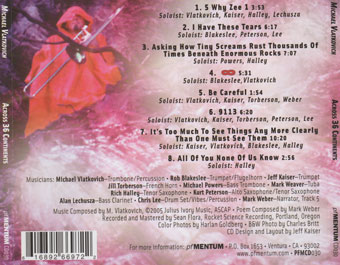
CD030 PRODUCTION
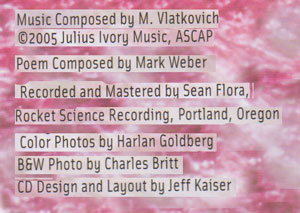
CD030 SPREAD RIGHT
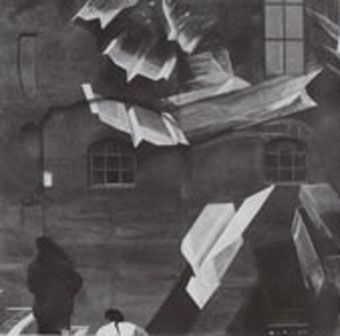
CD030 SPREAD RIGHT
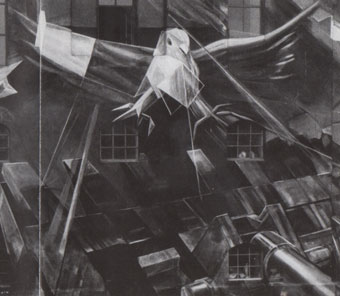
CD030 DISC
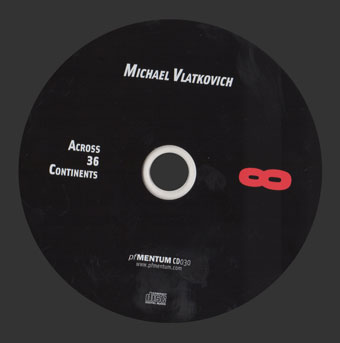
Queen Dynamo
Michael Vlatkovich Tritet
PURCHASE
PERSONNEL
Michael Vlatkovich - trombone
Jonas Tauber - bass
Ken Ollis - drums
REVIEWS
...Vlatkovich is the finest trombonist improvising today.
Jazz Review
It's hard to say how the average jazz fan comes to an appreciation of improvised music—and we're talking here spontaneous compositions, not merely an improvised solo in the middle of a mainstream song. One avid listener's introduction to the genre occured some years ago at a concert/lecture in a small state college auditorium. Two young musicians—bass and piano—held forth with a very interesting history of twentieth century jazz, from Louis Armstrong through Ellington and bop and fusion, playing examples of each along the way.
Almost an afterthought, it seemed at the time, was their closer, a five minute song composed on the spot that lit the room up. Vibrant, edgy, full of unexpected twists and spirals and jagged happy little turns. It got the biggest round of applause of the day. Most in attendance, I'd bet—excepting the musicians' friends—had never heard anything quite like that.
Trombonist Michael Vlatkovich's vibrant new disc of improvised music, Queen Dynamo, offers the same kind of interest and excitement. I first came across Vlatkovich on trumpeter Rob Blakelee's Last Minute Gifts' (Louie, 2000), a classic, brassy quartet outing of spontaneously composed songs. On Queen Dynamo Michael Vlatkovich employs a tritet, or trio, with Jonas Tauber on bass, and Ken Ollis in the drummer's seat.
The sound here, on the freer end of the jazz spectrum, is based on the induividual players listening to and reacting to each other, involving themselves in spirited conversations. And the voices in these three-way conversations are quite assured, assertive, without ever devolving to argument or boisterous cacophonies.
Vlatkovich uses the plunger a bit, and he growls at times, but for the most part he employs a straightforward trombone sound. His bandmates share his vision: bassist Jonas Tauber brings his instrument to the front line a good deal of the time, and the guess here is that he's classically trained; his assertive bowing adds some beautiful stretched textures to the sound. Drummer Ken Ollis lays back mostly—very effectively—in a accompanist's mode, sometimes adding just a whispered percussive undercurrent behind the two relative blowhards (meant in the best possible sense of the word) up front. And having just written that, I pause at the keyboard to listen to the drummer add dashes of color behind some dark hues on "South for the Winter."
A first rate set of improvised sounds, very accessible to anyone who's gone there, yet still adventurous and always interesting. You never know where these guys are going next, and that's a big part of the appeal, of course.
AAJ NEUROSIS
http://neurosis01.blog.163.com/blog/static/1857090672014629111658473/
Well known in improvised music circles for 30 years, Los Angeles-bred (& now Portland-based) trombonist Michael Vlatkovich scales down his usual large Mingus-inspired group to explore the immediate intimacy of the trio. Along with the virtuostic Zurich-based bassist Jonas Tauber and Portland drummer Ken Ollis, Tritet's wide ranging program and orchestrations belie the expected limitations of the trio's instrumentation and keeps the recording interesting as well as inspiring. "...the depths of his imagination are so densely packed with the new and the fresh that listening to Vlatkovich blow is to hear improvisational jazz for the first time, every time."
The Weekly Alibi. http://originarts.com/recordings/recording.php?TitleID=82420 - sthash.lZAeZvIt.dpuf
It's hard to say how the average jazz fan comes to an appreciation of improvised music and we're talking here spontaneous compositions, not merely an improvised solo in the middle of a mainstream song. One avid listener's introduction to the genre occured some years ago at a concert/lecture in a small state college auditorium.…
All About Jazz (Dan McClenaghan )
A deeply interesting album of progressive jazz from the Portland trombonist Michael Vlatkovich. Abandoning his usual big band, Vlatkovich instead takes up a small trio (actually a "tritet" by his own account) of bass, drums, and himself on trombone. Joining Vlatkovich in the trio are Swiss classically-oriented bassist Jonas Tauber, and fellow Portland drummer Ken Ollis. The music is largely improvised, with some structure imparted by Vlatkovich, but the bulk being spontaneous between the artists. With only the three musicians performing, the sound is surprisingly thick and full, with layers of sound overlaying one another expertly. The sound textures can get a bit out of the usual range, á la free jazz, but there's just enough structure present to keep it in the 'progressive' realm instead. The dividing line between free and progressive is, of course, up for debate, and this collection perhaps pushes the debate a bit, but regardless of its classification, the music itself stands up quite well. It's not music for a lazy Sunday afternoon, but it's really not trying to be that either.
All Music Guide (Adam Greenburg)
Michael Vlatkovich refers to his three-piece ensemble as a "tritet," maybe, I assume, to avoid the inevitable comparisons to all those other horn plus bass and drum trios. It's easy to see why. While that standard trio is typically used because of the openended freedom it allows, Vlatkovich's vision is more orchestral. True, the melodic material that bookend the performances tends to be little more than fanfares. But these simple melodic declarations then get symphonic treatment. Employing an arsenal of mutes the leader evokes an entire wind section while Jonas Tauber's bass saws away with the vitality of a full string section. His arco solo (he favors arco work throughout) on "The Daily Parade..." has the intricacy of a classical etude but never fails to swing. Ken Ollis on drums complements this with symphonic rumbles, rolls, splashes and crashes.
Right out of the gate on "Our costumes..." Vlatkovich sounds the charge bouncing out a bugle call-like figure. Leading into his solo, he simplifies it at first, exploring its implications with Tauber's bowing out with a counterpoint that rises to restate the opening motif and set the tone for his own solo. His improvisation evolves into a rapid, repeated figure backed by Ollis' brushes over which Vlatkovich wah-wahs away. A drum solo that starts with brushes but ends with a cadence played with sticks that marches the track on to its conclusion.
Throughout the compositions are developed not as a series of solos but as interconnected episodes within a narrative. On "South for the Winter," Vlatkovich develops the Bop theme over Ollis' agitated martial beat. When he gives way, Tauber slows the pace down, at first taking the tune in another direction which circles back to an up tempo duet with the trombonist. Ollis on drums starts by rummaging around his set before reestablishing the martial mood with timpani-like accents. The closer ,"The Blue Robes," flows from a majestic bass cadenza to a brief trombone-percussion conversation to trombone flaying away over a darting bass line. As usual, Vlatkovich allows plenty of space to let his accompanists shine through. Tauber matches the virtuosity of his opening arco work with pizzicato gymnastics. Ollis then systematically sounds out various components of his set. His summoning of his percussive resources is similar to the way Vlatkovich makes use of the resources of his "tritet" throughout this striking recital.
Cadence (David Dupont)
- See more at: http://originarts.com/recordings/recording.php?TitleID=82420#sthash.lZAeZvIt.dpuf
ART
TRACKS:
1.Our Costumes Should Tell Us Who We Are And What We Think 6:27
2. The Length Of The Tail Doesn't Really Matter But It Does Have To Be Bushy 10:41
3. My Other Name Is Longer By Two Letters Each 6:24
4. The Daily Parade Dragging Their Lives Behind Them 3:01
5. All Flat Deebee Geegee Too 4:33
6. Blue Peepers 7:10
7. South For Winter 6:26
8. Queen Dynamo 8:57
9. The Blue Robes 9:54
PRODUCTION:
music composed by M. Vlatkovich, Julius Ivory Music (ASCAP)
recorded and mastered by Sean Flora at Alberta Music Collective
produced by Michael Vlatkovich
executive producer: Jonas Tauber
artwork by Harlan Goldberg
layout & design by John Bishop
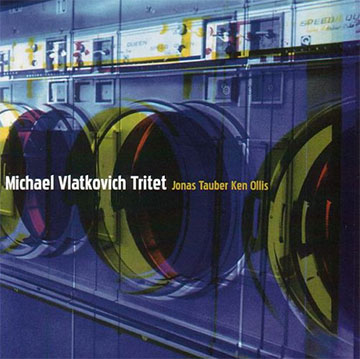
PARLOR GAMES
PURCHASE
PHYSICAL CD
MV009 (CD) (2002)
$20.00
INCLUDING SHIPPING
The people in the front are going to have a good time.
The people in the back are going to have a good time too.
PERSONNEL
Michael Vlatkovich – trombone / compositions / percussion / voice / piano
Lou Gonzales - trumpet
David Riddles - contra alto clarinet
Jay Hutson – soprano, tenor sax
Michael Jacobson - cello
Harlan Goldberg - drums
Chuck Britt – voice / percussion
Gary Denton – percussion / guitar
Warren Hartman – voice / synthesizer / electric piano
David Crigger – percussion / drums
Dominic Genova - bass
Mark Underwood - trumpet
Ken Park - drums
Vinny Golia – tenor / baritone sax
Bill Masonheimer - tuba
Michael Jacobson - cello
Devorah Juanier - acoustic piano
REVIEWS
Trombonist Vlatkovich challenges some internal sense of balance with his "Parlor Games". Mostly a large group recording, it feature mixed winds, voice and strings cycling through some composed forms that give an impression of fanfare, as though a postcard of Charles Ives had been glued to Vlatkovich's music stand during the session.
Source of this review not known.
Journeyman West Coast composer and trombonist Michael Vlatkovich, who over the course of his 20-year career has always been—in the words of help wanted ads—a self-starter, has been particularly busy of late. These two issues (one on his own label Thankyou Records) are the second and third from Vlatkovich’s hand that I’ve reviewed in the past month. All—the other was a trio date on Origin—clearly are the work of the same, fertile musical mind. Yet each demonstrates how flexible Vlatkovich’s muse is.
Parlor Games is a showcase for his compositions. Like his trombone playing, they demonstrate a concern with timbre as well as a stylistic reach that extends from free blowouts to peppy show tunes. The core vocabulary, though, is a kind of modern romanticism, full of evocative turns of phrase and rich harmonies. Even on “Were the Dogs Drinking Water or Was It Roller Skating?” (Vlatkovich has a knack for titles that are at once odd and poetic, yet comic), delivered by a four-piece band, he elicits a vibrant range of colors, using a variety of mutes on his trombone. And on Warren Hartman’s “The Kissing Song”, one wonders why more singer-songwriters don’t employ a percussion and trombone backup band. On most tracks Vlatkovich uses an ensemble of six to eight pieces.
These pieces are compositions, not tunes intended to bookend a round of solos. Vlatkovich is adept at nurturing kernels of melody into fully bloomed compositions. On “Bye Bye ‘D’ Train”, the piece opens with a simple two-note declaration that’s followed by a related four-note lick. The entire eleven and a half minute fantasy grows from those six notes, eventually getting worked into a mariachi fanfare theme. The composer is well served here by soloists Vinny Golia, a regular collaborator, on baritone saxophone, and bassist Dominic Genova as they keep threading those notes through their improvisations. As the solos drift into collective improvisations those themes continue to be reiterated.
The opening “Angeles National Forest” is an atmospheric sound painting. Again Vlatkovich uses a simple rhythmic birdcall of a theme, here setting it against a ground fog of long tones from cello and contra-alto clarinet. The composer calls out “wa-wa!” from the underbrush. The piece builds to an ominous climax. That contra-alto clarinet, played expertly by David Riddles, adds a basso luster to several tracks. Its velvety texture enriches the ensemble’s bottom. That’s especially evident on the cinematic “Why Don’t You See Me”, which opens up with a detective show theme, followed by the evoking of a creaky merry-go-round, finally giving way to a free-form chase scene.
Tenor saxophonist Jay Hutson adds powerful blowing to several tracks, notably the closer “Animal Circus of Snow”. The piece starts with what sounds like a band getting ready to line up for a parade. The brass plays bell tones and arpeggios, while the drums rehearse a marching beat and Hutson wails away on tenor. The seemingly random ensemble suddenly makes a poignant modulation, leading to an unsettled circus rhythm. Hutson serves as the lead voice throughout and, when the massed horns rejoin him after playing unaccompanied, it is as if they were an extension of his horn. Vlatkovich and his rotating team of drummers also underpin the melodic development with shifting rhythms. On “Were Dogs...” David Crigger starts with a funk beat that slips into a reggae groove—such subtleties are characteristic of the joys within Vlatkovich’s compositions.
ONE FINAL NOTE, Jazz & Improvised Music Webzine by David Dupont 15 December 2004
ART
MV009 ENVELOPE BACK
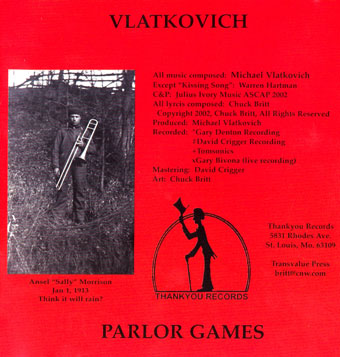
Ansel "Sally" Morrison. Jan. 1, 1913
Chuck Britt's Grandfather.
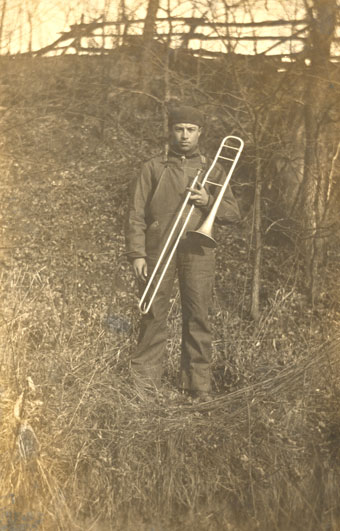
MV009 TRAY
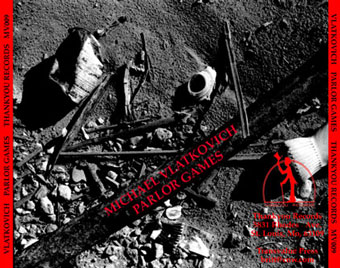
MV009 DISC
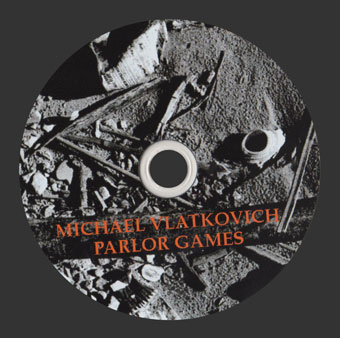
MV009 TRACK INFORMATION
MV009 TRACK INFORMATION

MV009 PRODUCTION INFORMATION
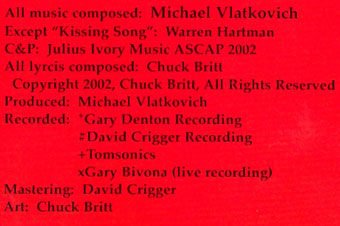
PARLOR GAMES


PAGE
03

Copyright © 2018 Michael Vlatkovich
Design by Chuck Britt
